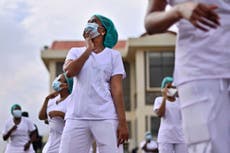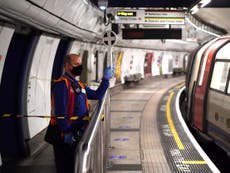The Independent's journalism is supported by our readers. When you purchase through links on our site, we may earn commission.
As doctors, we look after the sick. We did not go through medical school to become border guards
Those without indefinite leave to remain are charged at a 50 per cent mark-up. And people who can’t pay their bills can be reported to the Home Office
It was difficult to hear about Elvis, an undocumented migrant from the Philippines. He avoided seeking medical help because he was afraid of extortionate healthcare bills and immigration enforcement. He died in his home of Covid-19. The cruel irony is that Elvis would have been exempt from fees, but he did not know. Sadly, his story is not unique.
The NHS charging regulations require upfront payment for the full cost of care from those who cannot prove they are entitled to use the NHS. Worse, they are charged at a 50 per cent mark-up. Those who can’t pay their bills can be reported to the Home Office. This is one part of the hostile environment, a set of policies introduced during Theresa May’s tenure as Home Secretary, designed to make life as difficult as possible for those without leave to remain in the UK. As doctors, our purpose is to look after the sick. We did not go through six years of medical school to become border guards.
Although Covid-19 is technically exempt from charging, on the ground this is meaningless. For exemptions to be effective, a patient like Elvis would have to be confident his symptoms are due to Covid-19, be aware that a positive test result means he won’t be charged, and trust the authorities enough to not use his health data to force deportation. This is unrealistic. Exemptions did not prevent Elvis’s death.
But it is not just migrants who are harmed by the NHS charging regulations. During a pandemic, it is counterproductive to discourage anyone from accessing healthcare. Doing so leads to difficulty not only in controlling the virus, but can lead to a second wave.
It is on these grounds that a new report by Lancet Migration recommends the government suspends the NHS charging regulations, and accompanies this with thoughtful communications to overcome the fear that deters patients like Elvis. It states the government’s measures in response to the Covid-19 pandemic risk being ineffective without the explicit consideration and inclusion of its migrant and refugee populations. This report adds to calls made by MPs, the BMA, and voluntary organisations such as Doctors of the World.
The disproportionately high Covid-19 death rate among black people and people of ethnic minority, who are overrepresented in migrant communities, is well documented. The cause for this alarming mortality difference is still under investigation. But it is important, if not obvious, that we examine policies that may discourage BAME people from accessing healthcare. The NHS Charging Regulations are low hanging fruit.
Yet, in the face of clear disparities, the government is amplifying the hostile environment. The Immigration Health Surcharge is due to increase to £624 per year, a number that has more tripled in just two years. This surcharge is better thought of as a poll tax on immigration. As with all poll taxes, it is felt hardest by the poor, many of whom are today’s “key” workers. This week's U-turn to exempt NHS and social care staff from this poll tax, following bipartisan pressure on the government, is welcome. But low-wage migrant workers in other essential jobs are still to be squeezed out of their right to use essential services.
Meanwhile, the government’s Immigration Bill is an assault on the strength and resilience of the NHS and social care workforce. Research by the Institute for Public Policy Research found that two thirds of my European colleagues would not have been eligible for visas under the new immigration system. And, no, this cannot be justified by public opinion. A new survey by the pollster Ipsos MORI found that the majority of Britons want to see more migrant health and care workers from the EU, not less.
In the midst of this pandemic, policies that exclude any individual from healthcare threaten the health of all. While populism usually discriminates against a minority, the NHS Charging Regulations are harming the entire population. It is time the government listens to those of us on the frontline. The NHS and the hostile environment do not mix.
Parth Patel is a junior doctor in London, research fellow at the IPPR think tank and policy officer at Lancet Migration





Join our commenting forum
Join thought-provoking conversations, follow other Independent readers and see their replies